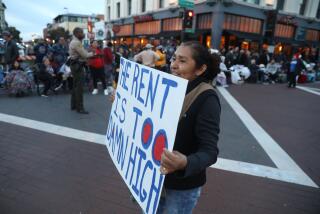Renting, Not Buying, May Make More Sense Financially
- Share via
The all-American dream of owning your own home can make those who rent feel like second-class citizens. Even if you don’t mind renting, you have to confront the many anti-renting myths that abound in this country.
And the pressure’s been on the last few years with low interest rates, enticing even die-hard renters to buy. But now that mortgage interest rates are climbing again, many would-be first-time home buyers have to face the fact that buying a home is not always the best financial decision.
From a purely financial perspective, you can do the numbers to come up with a compelling reason to buy a home or continue renting. But many of the methods of computing these numbers differ and are slanted one way or the other.
Many mortgage calculators on the Web, such as Quicken’s (https://quickenloans.quicken.com/Tools/RentvsBuy/RentQuery.asp) and eLoan’s (https://www.eloan.com), give you a rather one-sided picture of how much better off you’ll be as a homeowner. They don’t take into account any money you might invest while you rent. If you want a comparison of the money you would spend on a house versus the down payment money you’d invest instead, you need to do a more complex calculation.
More advanced computer programs help you compare a 30-year investment in stocks and bonds to a 30-year investment in your house. When I ran the numbers, using spreadsheets created by Mitchell Levy, author of the book “Home Ownership: The American Myth,” I discovered that the current interest rate made all the difference in whether homeownership came out better. The spreadsheets help evaluate whether owning a house or renting while saving and investing is going to be more lucrative for you in the long run. Contact mlevy@mythbreakers.com or https://www.mythbreakers.com to obtain the spreadsheets for $32.50.
Many myths surround the rent-versus-buy question in this country. The National Multi-Housing Council is trying to debunk some of these myths on its Web site (https://www.nmhc.org/media/rentvsown/default.html). I recommend that every renter read the articles posted on this site before diving into the world of homeownership.
Here are some common anti-renting myths:
* I’ll pay less in taxes.
The biggest homeownership myth in this country is that owning a home is a huge tax break.
“Renters already get the standard deduction,” says Jack Goodman, chief economist for the housing group. “If your mortgage interest and other itemized deductions do not go above the standard deduction amount, you don’t get any tax advantage.”
The current standard deduction for a single head of the household return is $6,350. For a couple filing jointly, it’s $7,200.
Even if you do have a larger deduction with a home, it is only a deduction from taxable income.
* I’m just throwing my money away on rent. It feels like a terrible waste, giving your money to some landlord every month. But what about throwing away money to the bank?
“Most of what homeowners pay the first five years is interest,” Goodman says. “You’re not paying down principle; you’re not building equity. That’s money down the drain too.”
Because nearly half of all homeowners move in the first five years, you need to compare the cost of renting to homeownership over the first few years.
* Putting equity in my home is a smart investment. For those renters who are miserable savers, a forced savings plan (such as a mortgage) can really help. Instead of paying your rent, you pay your mortgage and build up equity in your home. When it’s time to retire, you can cash in on your house.
But is this really a wise investment strategy?
“Do you want to put all your eggs in one basket?” asks Goodman. “It’s like putting all your wealth in a single stock in the stock market. It’s risky.”
Is your house going to appreciate as much as the stock market, for example? If you look at the last 10 years and compare appreciation of homes to the stock market, you’ll see that real estate has performed dismally compared with the huge gains in the stock market.
* I’ve got a great job; I won’t need to move. You may plan to stay put for a long time. But what if you lose your job and need to relocate to find another one? If that happens, the cost of reselling your home can be daunting. The real estate commission is a hefty sum that you don’t want to pay if your house hasn’t appreciated significantly.
Send questions to Leta Herman, care of Inman News Features, 1250 45th St. Suite 360, Emeryville, CA 94608. Distributed by Inman News Features.
More to Read
Inside the business of entertainment
The Wide Shot brings you news, analysis and insights on everything from streaming wars to production — and what it all means for the future.
You may occasionally receive promotional content from the Los Angeles Times.










